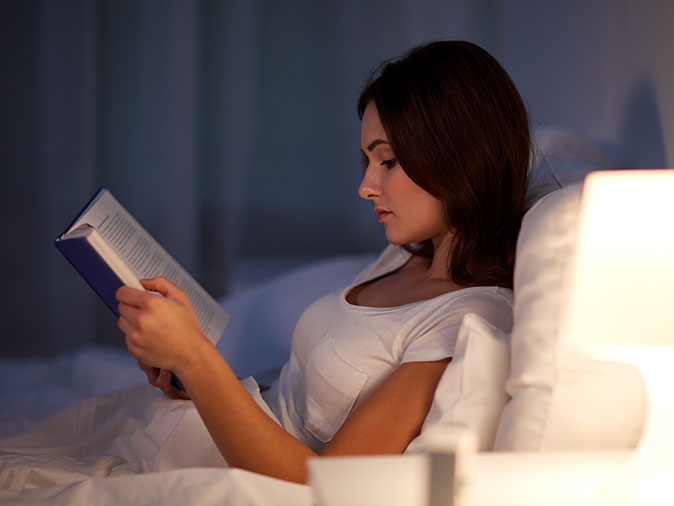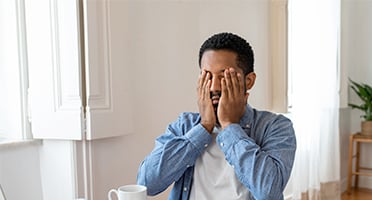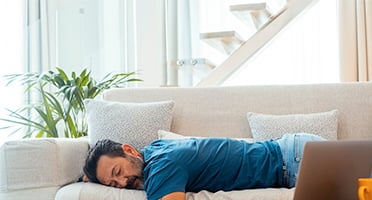There are few things as important as getting good sleep, yet we have many behavior patterns that can leave us tired each morning without realizing it. While a few nights of poor sleep aren't so bad, it isn't good to get into a habit. Your body needs quality sleep. It is important for brain function and mental health. What's more, poor sleep can lead to chronic physical health problems. Who needs that? Let's make 2024 the year you start getting better sleep. Here are ten tips that can help you sleep better.

1. Wake Up At The Same Time
It is not commonly understood, but waking up at the same time is far more important than going to bed at the same time. It sets your body clock and conditions your body to look forward to sleeping. When you sleep in, your body thinks that it can get away with doing that, and won't prepare itself for a good night's rest.
2. Create An Environment For Sleep
You will sleep best if it is dark. Draw the curtains, pull the shades, and wear a mask to help keep the light out. Consider getting blackout curtains if needed. Managing sound is next on the list. If you're able to create a quiet environment, it is important to do so. If not, a sound machine can help to block sounds that might disturb you while you sleep, such as traffic outside your window. If more sound management is needed, consider earplugs. Lastly, consider sleep comfort. It pays to invest in comfortable bedding and a quality mattress that supports a good night's sleep.
3. A Bedtime Routine Is Essential
If you do the same thing every night, your body knows that it is time to sleep. Create a pre-sleep ritual that you can stick to and one that helps you wind down. Consistency is key to training your body to recognize when it's time to sleep. Some examples are, fluffing your pillows, turning your covers down, and getting your ambient sound machine ready.
4. Avoid Naps If You Don't Sleep Well
When you're tired, you want to nap, but naps are not a good idea if you don't sleep well. When you sleep during the day, you may not have enough wake time in preparation for sleep. It is best to stay up all day if you can. You don't want to interfere with your nighttime sleep. If you do take a nap, take it early in the day, before 3 pm.
5. Take A Hot Bath Or Shower
Why does a hot bath or shower before bed help you get better sleep? The shower or bath warms your body up before you lay down to sleep. As you lay, your body cools down, and this helps initiate the sleep process.
6. Refrain From Eating Before Bed
We all like a nighttime snack, but food and sleep don't go well together. Why? Your body is busy digesting, rather than getting into a restful state of sleep. There are also other issues that can arise, such as acid reflux and heartburn. It is best to avoid eating at least an hour or two before you retire for the night. Likewise, alcohol before bedtime can be detrimental to the quality of your sleep.
7. Avoid Computer Screens Before Bed
Your computer screen, tablet, or phone can cause you to get poor sleep. Blue light impacts your sleep/wake cycle. It is best to reduce exposure to blue light emitted by screens at least an hour before bedtime. If you need that screen time, try using blue light filters or put your device into night mode.
8. Get Exercise
If you don't do enough during the day, your body may not be ready to sleep. This is only one reason to stay active during the day and get exercise. Exercise helps reduce stress, increase relaxation, relieve tension, boost serotonin levels, and improves your circadian rhythm; all of which will help you get better sleep at night.
9. Natural Sleep Aids
Some things help you prepare for sleep and bring relaxation. Tea is a great example. A nice cup of chamomile before bedtime may be a great way to get you prepared. You can add it to your nighttime routine for added benefit.
10. Invest in Sleep-Friendly Technology
Explore the latest sleep technology designed to enhance your sleep environment. This includes smart mattresses, sleep trackers, and white noise machines. These tools can provide valuable insights into your sleep patterns and help you make adjustments for better rest.
Contact A Professional If Needed
On a final note, there are medical conditions that can impact your ability to get sleep at night. For example, if you have sleep apnea, you may not sleep well no matter what you do. A local dentist or doctor can help you address medical issues and provide you with the support you need.
Are you ready to get better sleep in 2024? It may only take a few simple alterations. If you'd like to track the result, we can help. Connect with us to learn about our at-home sleep tests and simple, user-friendly equipment. We provide what you need to evaluate your sleep and get professional assistance if you need it.

Feeling tired all the time, even after a full night’s sleep? You might be suffering from sleep apnea. Discover how an at-home sleep test can help diagnose the root cause of your fatigue—and get you back to feeling like yourself.

Spring is here—and so is the pollen. For the millions dealing with seasonal allergies, the symptoms can be more than just annoying. And if you also have sleep apnea, those stuffy nights and restless sleep can get even worse.
Let’s take a closer look at how spring allergies and sleep apnea affect each other—and what steps you can take to sleep more comfortably.




